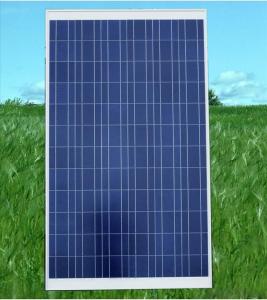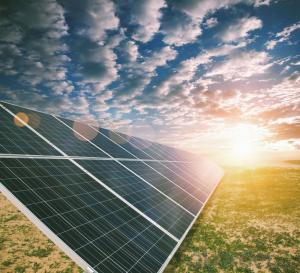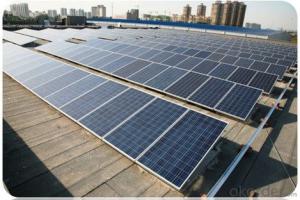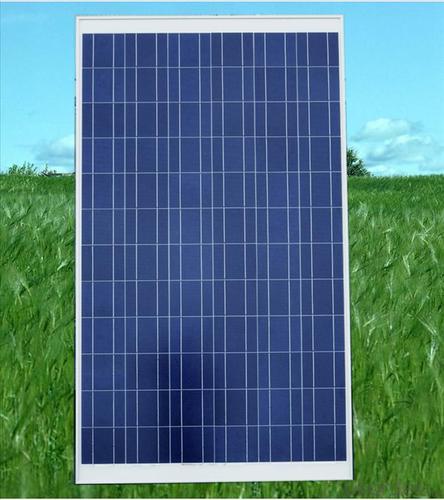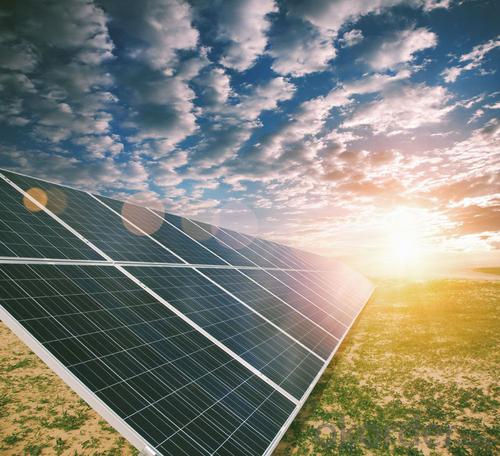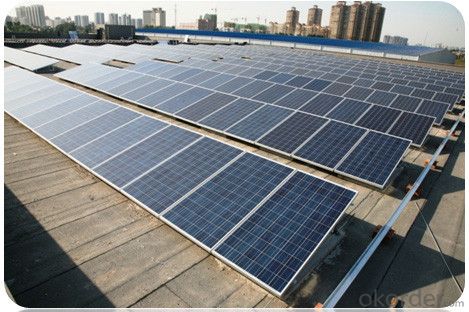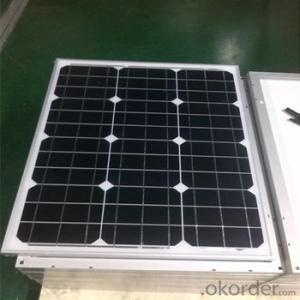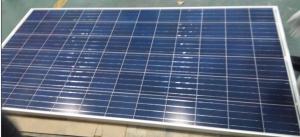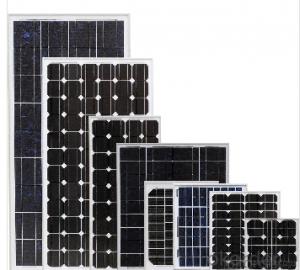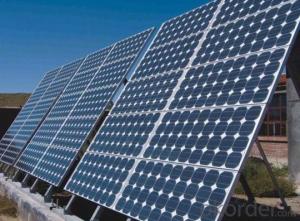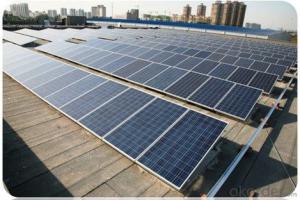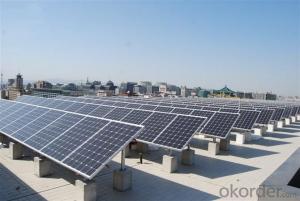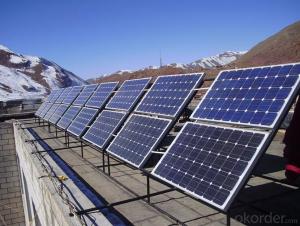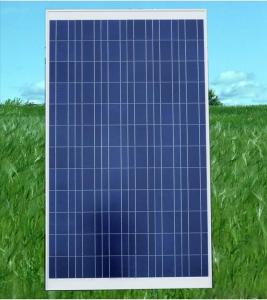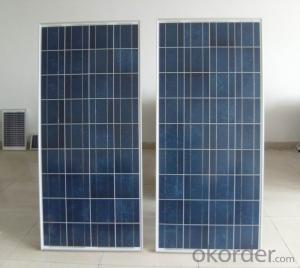Home Depot Solar Panels Kits:295W Polycrystalline Silicon Solar Panel
- Loading Port:
- Guangzhou
- Payment Terms:
- TT OR LC
- Min Order Qty:
- 200000 watt
- Supply Capability:
- 20000000 watt/month
OKorder Service Pledge
OKorder Financial Service
You Might Also Like
About us
We are a high-tech group wich specializes in solar products design,research, manufacture, sales,solar projects design and installation.
Our national sales service covers seven parts, including northeast, north, east, middle, south, northwest and southwest, international sales covers five continents and over forty countries, including Germany, Italy, Spain, France, America and Brazil etc.
Our present annual capacity is 6 million for wafer, 60MWp for solar cells,200MWp for solar modules and one hundred thousand for solar applications. It is expected that the annual capacity of 2012 will be up to 30 million for wafer, 300MWp for solar cells, 1000MW for solar modules and 2 million for solar applications.
Process is as follows:
1, the battery test
2, positive Welding - Inspection –
3, on the back of cascading - Inspection –
4, laying (glass cleaning, material cutting, glass pre-processing, laying) –
5, laminating –
6, to flash ( to the side, cleaning) –
7, fitted border (glue, loading angle keys, punching, install box, scrub I glue) –
8, the welding junction box –
9, high-pressure test –
10, component testing -- -
11 appearance inspection, packaging and storage;
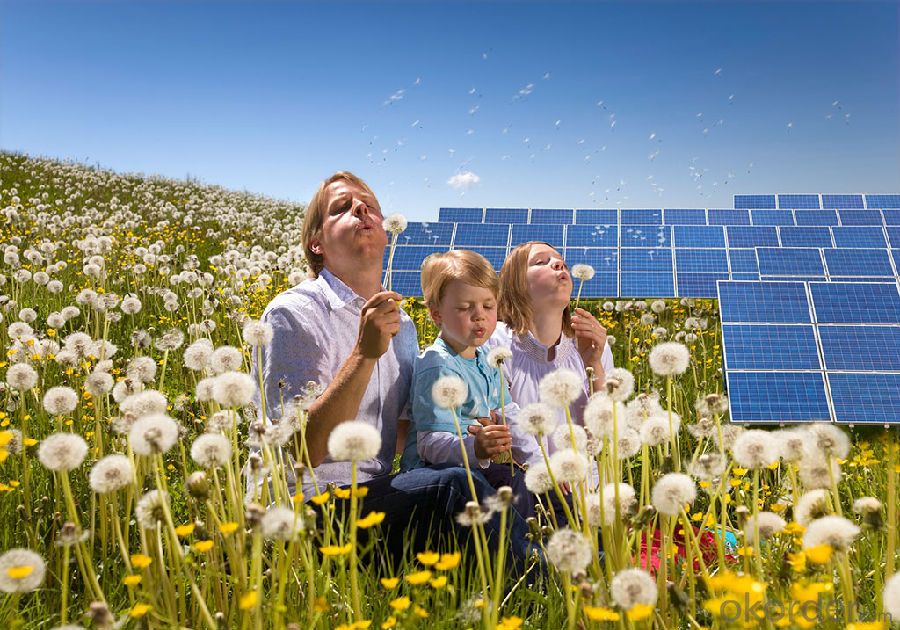
Data sheet
Maximum Power | 295W |
Efficiency | 0.152 |
Backsheet | White |
Frame Colar | Silver |
Manufacture Site | China |
Frame | Anodized Aluminum Alloy |
Weight | 27 kg |
FAQ:
1. How long will my inquiry get response?
Your inquiry related to our products or prices will be replied within 24 hours.
2. Can I get professional service and suggestion?
Well-trained and experienced staffs to answer all your questions in fluent English.
3. Do you accept OEM or customized design?
OEM & ODM, any your customized lightings we can help you to design and put into product.
4. What if I need specific design?
Distributorship are offered for your unique design and some our current models.
- Q: this solar panel i saw was for 500 dollars(i get a 25% discount)and i was curious will they produce electricity? or just heat?what do they do?is it a good investment?here is a link to the one i would like, no reviews but it looks new to the site.
- This is a photovoltaic panel...it produces electricity from incident solar radiation. Solar thermal panels produce heat, and they are usually assists for hot water heating systems. Solar thermal panels have piping in them instead of semiconductor cells like photovoltaics do.
- Q: If you need 9400 watts, 75 amps@ 240V, how many solar PV panels do you need?
- Create okorder
- Q: Can solar panels be used for heating water?
- Yes, solar panels can be used for heating water. Solar water heating systems utilize the sun's energy to heat water for domestic or commercial use. These systems typically consist of solar collectors, which absorb sunlight and convert it into heat, and a storage tank to store the heated water.
- Q: I've recently started a project to help my store become more green and I need to get some estimates from businesses and if all goes according to plan we will have some panels on our roof and some other measures that I've written into my proposal. Any help is welcome. Just so you know it's a large grocery store in a corporate chain and I've been approved to do all the research, just no promises of payment.
- Google the following: solar panels oregon. Here are a few from the first site listed below. Sorry for the capitalization; that was the site's formatting choice, not mine. SOLAR INC. 3698 Franklin Blvd Eugene, OR 97403 (54) 284-2426 ADVANCED ENERGY SYSTEMS 2990 FOREST BOULEVARD, EUGENE, OR 97405 Phone: (54) 683-2345 ALTERNATIVE POWER MACHINE 4040 HIGHLAND AVENUE, GRANTS PASS, OR 97526 Phone: (54) 476-896 CASCADE SUN WORKS INCORPORATED 2444 SE FIRST STREET, REDMOND, OR 97756 Phone: (54) 548-7887 ENERGY OUTFITTERS LTD. 543 NE E St Grants Pass, OR 97526 (54) 476-4200 ENVIRONMENTAL BUILDING SUPPLIES 89 SE TAYLOR STREET, PORTLAND, OR 9724 Phone: (503) 222-388 KING SOLAR SERVICES 4435 MAPLETON DRIVE, WEST LINN, OR 97068 Phone: (503) 635-5560 MR SUN SOLAR 3838 SW MACADAM AVENUE, PORTLAND, OR 97239 Phone: (503) 222-2468 OERGON SOLAR WATER TALENT, OR 97540 Phone: (54) 535-7332 PROTECH SOLAR 409 PINE STREET, ORETECH, OR 9760 Phone: (54) 882-4545 SOLAR ASSIST 395 CROSS STREET SUITE 2, EUGENE, OR 97402 Phone: (54) 338-4957 SOLAR COLLECTION INCORPORATED 934 PIONEER ROAD, TALENT, OR 97540 Phone: (54) 535-5364 SOLAR DESIGN CONSTRUCTION 825 SE PARK AVENUE, CORVALLIS, OR 97333 Phone: (54) 753-8725 SOLAR ENERGY SOLUTIONS 3730 SE LAFAYETTE COURT, PORTLAND, OR 97202 Phone: (503) 238-4502 SOLAR WIND POWER OF PORTLAND 0006 SW CANYON ROAD, WEST HAVEN SYLVAN, OR 97225 Phone: (503) 297-578 SUMMERS SOLAR SYSTEMS EUGENE, OR 9740 Phone: (54) 683-404 SUMMERS SOLAR SYSTEMS 7342 RAINBOW DRIVE SE, SALEM, OR 97306 Phone: (503) 363-408 SUNBOW SOLAR 074 NW RACHEL STREET, HILLSBORO, OR 9724 Phone: (503) 640-665 SUNLIGHT SOLAR ENERGY 4 NW FRANKLIN AVENUE, BEND, OR 9770 Phone: (54) 322-90 UNITED SOLAR COMPANY 905 SW BUTLER ROAD, GRESHAM, OR 97080 Phone: (503) 666-3065
- Q: i want to instal solar ligth in my garden
- hello, okorder /
- Q: I have heard you can make your own solar panels.... But How?Where do you start? Is it cheap, or should I just BUY them already made?
- I'm okorder / for one of the few honest warnings about solar scams.
- Q: Hi everyone, I am a novice in solar energy system. I want to know if I am on the right track. Recently I bought a 30 W solar panel, 5 Amp controller, and a 22 Ah battery, how many watts and what kind of INVERTER do I need? I did an research some said 50 W and some said 300 W. And am I right on the 5 amp controller and 22 Ah battery to provide larger output of electric, or the higher the # the greater output for 30 W solar panel?Really appreciate for anyone who help!!!
- must be one of the place who's place have sun
- Q: solar panels are way too expensive to buy, can they be homemade cheaply? i want at least 500 watts. everyone on the web sells these instructions, but i'd like a link to free info, if it is really possible for a non-sciencey person to make. thank you
- The idea is to hand assemble scrap solar cells that would otherwise be thrown out. At one point in time, very few people would want to do this so you could get the broken solar cells for free but now they sell them by the watt. It's still cheaper than a pre-fabricated solar panel but it's very labour intensive. Technically it's like wiring a bunch of batteries together, you measure the voltage and current a broken cell produces and decide whether or not to wire it in series or in parallel with other cells to get the performance characteristics that you want plus try to fit them onto some kind of structural panel in a fashion that uses the space efficiently. Since your handiwork is likely to be fragile, you'll probably have to put some plate glass on top to protect the cells from the elements, you can also improve performance by positioning fresnel lenses to increase the amount of light on active elements versus inactive areas of the panel.
- Q: I have some property off the grid and am looking to add solar power
- Of okorder /... , and shop the web for the best panels for yourself. p.s. I'd avoid amorphous silicon panels. They may be cheap, but they'll go bad or seriously degrade in just a few years. p.p.s. I'd also avoid internet guides that claim you can make your own panels very cheaply, if you'll just pay them $$ for the information. Those guides don't live up to their advertising.
- Q: Pros and Cons if I get solar panels?
- Maybe. okorder /
Send your message to us
Home Depot Solar Panels Kits:295W Polycrystalline Silicon Solar Panel
- Loading Port:
- Guangzhou
- Payment Terms:
- TT OR LC
- Min Order Qty:
- 200000 watt
- Supply Capability:
- 20000000 watt/month
OKorder Service Pledge
OKorder Financial Service
Similar products
Hot products
Hot Searches
